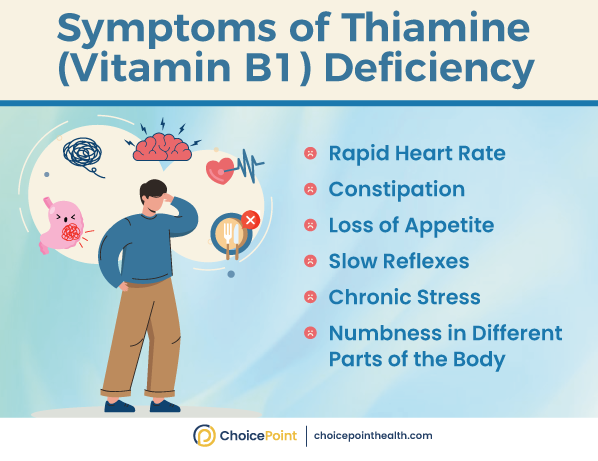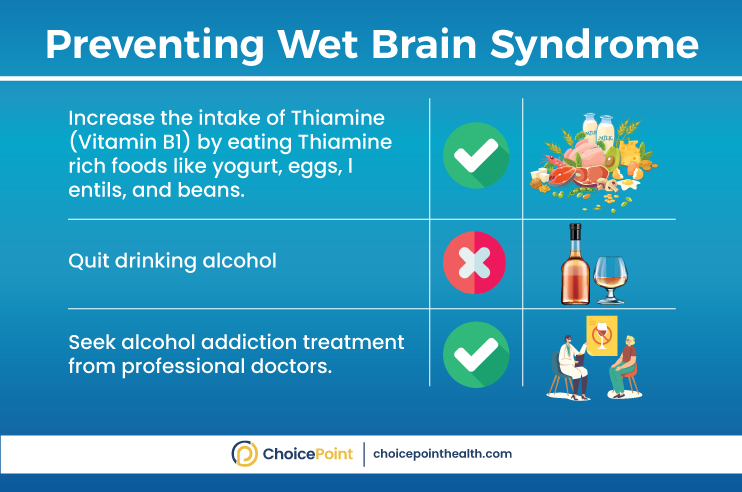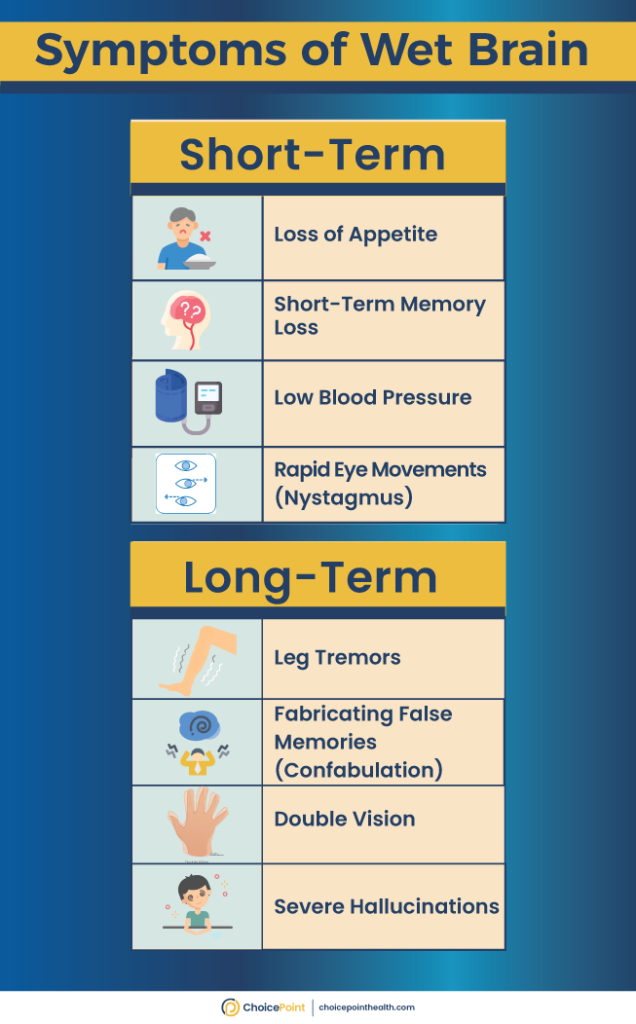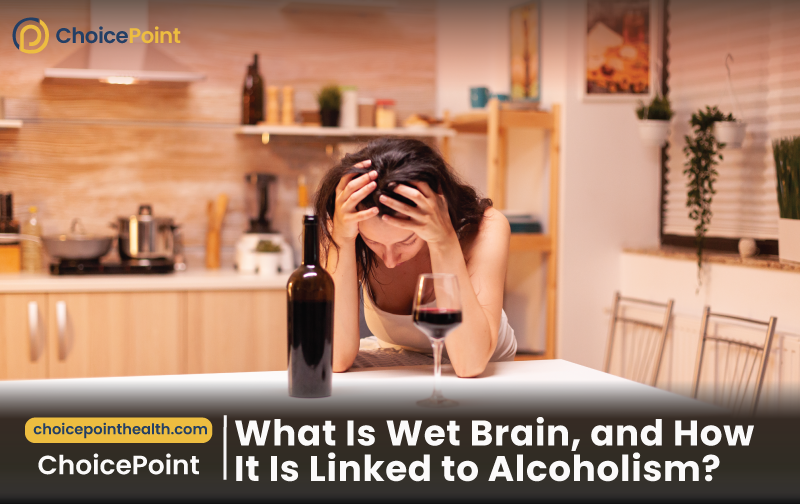Alcohol addiction negatively impacts one’s mental and physical well-being. We know about the common problems caused by abusing alcohol, but do you know what wet brain syndrome is and what it feels like to have wet brain?
It is a relatively lesser-known disorder caused by abusing alcohol, but that doesn’t make it any less harmful for the abuser. Almost 90% of wet brain cases are caused by alcohol abuse. And according to the Alzheimer’s Association, if the symptoms of the wet brain are diagnosed early, only 50% of patients can show improvements. Yes, you heard it right; if left untreated or undiagnosed, it can lead to fatal consequences.
But don’t worry. Addiction doctors and clinical psychologists at ChoicePoint can help you on the path to Alcohol Addiction Recovery. Get help now by calling us at 844.445.2563.
Table of Contents
What Is Wernicke-Korsakoff (Wet Brain) Syndrome?
“Wernicke and Korsakoff syndrome (WKS)” is a brain disorder in alcoholics. It is commonly known as wet brain. Wernicke-Korsakoff is a combination of two disorders that happen simultaneously.
Alcohol Abuse Causes Thiamine (Vitamin B1) Deficiency
Thiamine deficiency is the leading cause of wet brain syndrome because lack of Thiamine causes damage to brain cells. Alcohol abuse makes it extremely difficult for our body to absorb Thiamine. And when there is a thiamine deficiency in our body, it makes it hard for the brain to convert the sugar into energy, causing our body to develop symptoms of wet brain.
In short, the link between wet brain and alcoholism lies in the depletion of Thiamine caused by alcohol abuse. The wet brain syndrome is not to be taken lightly as it is a severe, life-threatening brain disorder. If the wet brain is diagnosed in its early stages, the treatment is relatively less complicated than if it is left undiagnosed for longer.
If you think you or your loved one might have symptoms associated with alcohol abuse, take our specially designed addiction assessment quiz or call us at 844.445.2563 to get started with your alcohol abuse recovery.
Understand the Link Between Alcoholism and The Wet Brain
The human brain needs an adequate amount of Thiamine to work properly. Too much intake of alcohol hinders the absorption of Thiamine in the system. According to reports from National Institute on Alcohol Abuse and Alcoholism (NIAAA), about 80% of people who abuse alcohol have a thiamine deficiency, and untreated alcoholism can most likely lead to the development of wet brain syndrome.
To understand the symptoms of wet brain and how it is linked with alcohol abuse, you should first understand the importance of Thiamine in our body and how the depletion of Thiamine can lead to wet brain.

Common Symptoms of Thiamine Deficiency
Importance Of Thiamine
Thiamine is an essential vitamin for:
- Building enzymes that convert sugar into energy
- Creating chemical messages in the brain
Ironically, our body cannot produce Thiamine, and we have to consume it by adding whole grains, beef, eggs, and potatoes to our diet. This is not a big deal for an average healthy adult. But a person with alcohol addiction will struggle with thiamine deficiency.
Learn how alcohol abuse causes thiamine depletion, which in return becomes the main cause of the wet bain:
- Too much consumption of alcohol can cause inflammation in the stomach lining.
- It can reduce the ability to absorb essential vitamins: case in point- Vitamin B1.
- Alcoholics tend to make poor dietary choices that lead to malnutrition.
- Consumption of too much alcohol leads to constant vomiting, causing malabsorption.
- When the need for Thiamine is unmet, it causes thiamine deficiency, which can lead to developing wet brain syndrome.
Find out all about the superfoods that top nutritionists suggest eating during addiction recovery treatment.
Stages and Symptoms of Wernicke-Korsakoff Syndrome (Wet Brain)
The onset of the symptoms of wet brain from alcoholism occur suddenly and are divided into two stages:
- Stage 1: Wernicke’s Encephalopathy
- Stage 2: Korsakoff’s Psychosis
Stage 1: Wernicke’s Encephalopathy
Wernicke or Wernicke’s encephalopathy is a severe yet temporary condition.
- A neurological disorder.
- Responsible for causing damage to the hypothalamus and thalamus parts of the brain.
- It affects the brain, which is responsible for keeping and handling memories.
- Consider the acute phase of the wet brain syndrome.
Some of the most common symptoms of Wernicke’s encephalopathy are:
- A constant state of confusion
- Low blood pressure
- Drooping eyelids
- Hypothermia
- Muscle incoordination (Ataxia)
- Leg tremors
- Double vision
- Rapid eye movements (Nystagmus)
Make sure to check out our Free Addiction Assessment to help you gain insight into your alcohol dependence level.
Stage 2: Korsakoff’s Psychosis
Korsakoff or Korsakoff’s psychosis follows Wernicke’s encephalopathy. It is considered the chronic stage of wet brain syndrome, responsible for damaging the nerves and supporting cells in the brain. Korsakoff’s psychosis is also a form of neuropsychiatric dementia.
Korsakoff’s Psychosis symptoms include:
- Fabricating false memories (Confabulation)
- Inability to retain new information or form new memories
- Severe Hallucinations
- Overall body tremors
- Double vision
If you or your loved one is struggling with alcohol addiction and are looking for Addiction Treatment centers in New Jersey, help is just a click away. Contact us at 844.445.2563.
Is Wet Brain Like Dementia?
The impaired ability to make decisions, think properly and remember past events effectively is called dementia. Dementia is not part of normal aging. Among other reasons, it can occur in people who struggle with substance abuse. Alcohol is reportedly one of the main causes of the onset of dementia. According to current estimates, about 5.8 million people residing in the USA have dementia.
As discussed earlier, wet brain or Wernicke-Korsakoff is caused by untreated alcoholism. Not only is the wet brain (Wernicke-Korsakoff) dementia-like, but also it is the type of dementia that is caused by prolonged alcohol addiction. It is very rare to find a case of a person suffering from Wernicke-Korsakoff where a person didn’t have a history of abusing alcohol.
How Long Can You Live With Wet Brain?
Medically, Wernicke-Korsakoff is considered a medical emergency that needs to be treated right away because if the symptoms are left untreated, they can be fatal. Alcohol abuse can cause thiamine deficiency, and without Thiamine, the tissues found in the brain start to deteriorate. The signals to and fro the brain responsible for storing and retrieving memories are disturbed. The toxic effects of alcohol also destroy the brain cells contributing to cognitive decline.

Top 3 Ways to Prevent Wet Brain Syndrome
If a person is diagnosed with wet brain(Wernicke-Korsakoff) and the disease has reached its last stage, life expectancy in such cases is reported to be very poor. If the disease is diagnosed early, there is a good chance of recovering. About 25% of the people recover after receiving the right treatment.
Want to help a loved one during their alcohol recovery journey? Check out this article for an early diagnosis and treatment.
How Can a Wet Brain (Wernicke-Korsakoff) Be Treated?
Wernicke-Korsakoff has two stages, as discussed above. If it has reached stage 2 (Korsakoff’s Psychosis), it may not be possible to reverse the symptoms completely. Still, there is a good chance of improving the condition if it is diagnosed in stage 1(Wernicke’s Encephalopathy).
The symptoms of wet brain in stage 1 may be treated and reversed using Vitamin B1 injections. But to address the underlying causes of the wet brain that is frequent and long-term use of alcohol, you still need an alcohol addiction treatment.
a) Alcohol Addiction Treatment
Since the wet brain is caused due to high alcohol indulgence, the first step to recovery is by completely quitting alcohol. A personalized alcohol addiction treatment plan can help you find your way back to an addiction-free life. Following are the stages of your alcohol addiction recovery journey:
- Outpatient Detox
- FDA-approved Medication-assisted Treatment (MAT)
- Addiction Therapies for Lifelong Sobriety
1- Outpatient Detox
Through the ChoicePoint personalized outpatient detox, all the toxic chemicals will be removed from your body. Our addiction specialists can help you to recover from alcohol abuse by taking care of all your needs.
2- Medication-assisted Treatment (MAT)
It can be challenging for you to cope with alcohol withdrawal symptoms. To help you manage them and get yourself recovered, ChoicePoint offers Medication-assisted treatment programs under the clinical supervision of experienced addiction doctors.

Common Symptoms of Wet Brain Syndrome
Following are the FDA-approved medications prescribed under the MAT program to treat alcohol addiction:
Medications mentioned above act as opioid antagonists and may reduce alcohol cravings.
3- Therapies for Lifelong Sobriety
Complete recovery from alcohol dependence is only possible if you get treatment for the underlying causes of addiction. ChoicePoint addiction treatment therapies that include cognitive-behavioral therapy and dialectical behavior therapy can help you to:
- Learn why you behave in a certain way
- Replace your destructive mindset with a healthier one
- Help you cope with the relapse and triggers
If you are going through alcohol abuse, don’t feel hesitant to seek help for yourself or a loved one; contact us at 844.445.2563.
b) Taking Vitamin B1 Injections
Vitamin B1(Thiamine) is essential for your body. Alcohol abuse causes Thiamine to deplete; therefore, to recover, you may need to take Vitamin B1 injections intravenously. The recommended dose of Thiamine to be injected intravenously in adults is 100mg.
c) Following a Well-balanced and Nutritious Diet
A person suffering from a wet brain should start taking natural foods that are highly rich in Thiamine, like:
- Beef
- Eggs
- Yeast
- Brown rice
- Green peas
- Yogurt
- Milk
A healthy diet is an essential part of alcohol recovery treatment. Make sure you take good care of yourself with the right nutrition. Please read what our expert Gillian McKeith has to say about this.
Wet Brain and Untreated Alcoholism: In A Nutshell…
Alcohol addiction should not be taken lightly, knowing well that untreated alcoholism can eventually lead to a wet brain syndrome, which, if left untreated, can take your life slowly. If you or a loved one is addicted to alcohol, trust us, you are not alone. You can beat this addiction by starting your recovery journey with ChoicePoint.
Our alcohol addiction treatment programs are comprehensive and result-oriented. With our telehealth program, you can get medication and therapy at the comfort of your home. Call ChoicePoint addiction treatment Fairlawn, facility at 844.445.2563, or visit outpatient rehab in NJ to get back the control of your life.
Medical Disclaimer:
ChoicePoint aims to improve the quality of life for people struggling with substance use disorder and mental health issues. Our team of licensed medical professionals research, edit and review the content before publishing. However, this information is not intended to be a substitute for professional medical advice, diagnosis, or treatment. For medical advice please consult your physicians or ChoicePoint's qualified staff.









Review What Is Wet Brain and How It Is Linked to Alcoholism?.